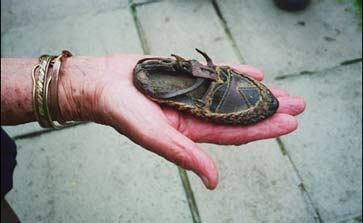
 The privately financed exhibit “Forced Departures” (“Erzwungene Wege”) is organized by the advocate for expellees Erika Steinbach.
The privately financed exhibit “Forced Departures” (“Erzwungene Wege”) is organized by the advocate for expellees Erika Steinbach.
Her ultimate goal is to establish a permanent research centre in
In addition to focusing on dispossessed Germans, it documents the plight of Poles and Jews deported by the Nazis, Armenians slaughtered by Ottoman Turks, Greeks and Turks displaced by the conflict in Cyprus, and Muslims and Croats persecuted by Serbs in Bosnia and Herzegovina. It is designed to offer an overview of the phenomenon of expulsion in 20th century
The organizers succeeded in recalling chapters in European history of which until now only experts were aware.
In the “Frankfurter Allgemeine Zeitung”, Regina M?nch says “From the massacres of Armenians in the Ottoman Empire through the ethnic cleansing in
For further information about the organizer?s activities, please visit their
Website: http://www.z-g-v.de/english/index.html
Additional
Following is a briefing about the Foundation, its main tasks and the endowment of the Franz Werfel Human Rights Award since 2003.
Our Foundation: “Zentrum gegen Vertreibungen” (Centre against Expulsions)
Our foundation is in existence since 6 September 2000. It was born in the awareness of the German League of Expellees, that it is necessary not to remain trapped by one's own suffering, in personal, traumatic memories: rather, it is necessary to create an instrument which contributes to the fundamental outlawing of displacement and genocide as a political tool.
It was for this reason that an independent foundation was established. Its objective is to counteract displacements and expulsions of peoples all over the world, to outlaw and to prevent them and thus to create understanding among nations, reconciliation and the peaceful neighbourliness of peoples.
The foundation has its headquarters in
Tasks and Objectives:
The foundation ZENTRUM GEGEN VERTREIBUNGEN (Centre against Expulsions) was founded in the spirit of reconciliation with all neighbouring peoples. It declares its solidarity with all victims of expulsion and genocide.
The foundation has four equal-ranking tasks, human rights always being central to them:
? First:
In an overview in Berlin, the fate of more than 15 million German victims of deportation and expulsion from all over central, eastern and south-eastern Europe with their culture and their history of settlement is to be made accessible, as is the fate of the 4 million German late repatriates who have been coming to the Federal Republic of Germany or came to the former GDR since the 1950's, above all since the end of the 1980's. These expelled and deported persons had their homes in the whole of central, eastern and south-eastern
? Second:
We wish to illuminate the changes in
? Third:
Expulsion and genocide of other peoples, especially in
? Fourth:
Awarding a prize to people who sharpen the sense of responsibility through their actions is one of the foundation's tasks. The prize may be awarded to individuals as well as to initiatives or groups who have turned against the breaching of human rights by genocide, displacement and the deliberate destruction of national, ethnic or religious groups.
Franz Werfel Human Rights Award:
With the endowment of the Franz Werfel Human Rights Award, the ZENTRUM GEGEN VERTREIBUNGEN is implementing one of the tasks anchored in its statutes.
The award is named after the great author Franz Werfel (1890-1945), whose novel “The 40 days of Musa Dagh” forcefully, effectively and with great artistic power portrayed the displacement of the Armenians from
Franz Werfel's heiress, Marina Mahler, permitted the use of the name by the ZENTRUM GEGEN VERTREIBUNGEN in a letter of 17.1.2002.
The Franz-Werfel-Human Rights Award includes ? 10,000 of prize money. It is awarded in the Paulskirche in Frankfurt/
Contact Address: 
ZENTRUM GEGEN VERTREIBUNGEN
Friedrichstra?e 35/V
65185
Phone: 0611 / 360 19 28
Fax: 0611 / 360 19 29
E-mail: [email protected]
Website: http://www.z-g-v.de/english/index.html
Photo:
“Baby shoe” description: this shoe was found by the writer Armin T.Wegner in 1915 on the side of a street, in where deported Armenians passed.
Article by Sylvia Bourdjian ? Matta
